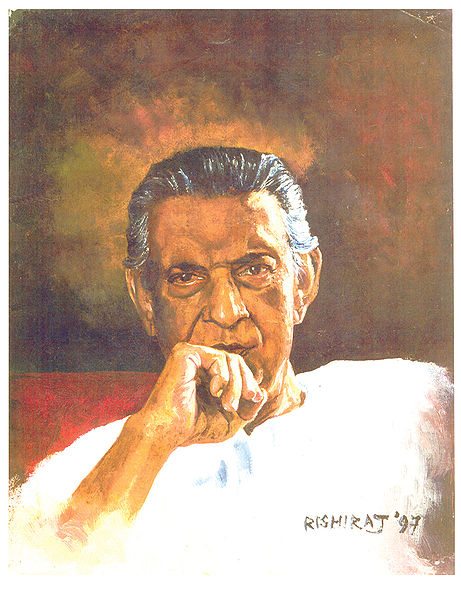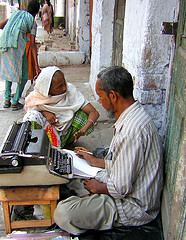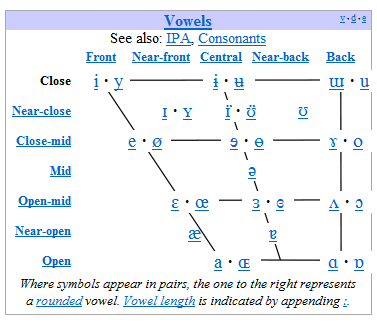6. An outstanding character from Kolkata in the world
Finally, in this section we'll deal with the modal verbs will and would,as well as the vowel sounds: /e/, /ə/ and /ɜ:/.
An outstanding character from Kolkata
 |
| By R. Sahoo. GNU license. |
Satyajit Ray (2 May 1921 – 23 April 1992) was an Indian Bengali filmmaker. He is regarded as one of the greatest auteurs of 20th century cinema. Ray was born in the city of Calcutta (now Kolkata) into a Bengali family prominent in the world of arts and letters. Starting his career as a commercial artist, Ray was drawn into independent filmmaking after meeting French filmmaker Jean Renoir and viewing the Italian neorealist film Bicycle Thieves during a visit to London.
Ray directed thirty-seven films, including feature films, documentaries and shorts. He was also a fiction writer, publisher, illustrator, graphic designer and film critic. Ray's first film, Pather Panchali (1955), won eleven international prizes, including Best Human Document at the Cannes film festival. Alongside Aparajito (1956) and Apur Sansar (1959), the three films form The Apu Trilogy. Ray did the scripting, casting, scoring, cinematography, art direction, editing and designed his own credit titles and publicity material. Ray received many major awards in his career, including 32 Indian National Film Awards, a number of awards at international film festivals and award ceremonies, and an Academy Honorary Award in 1992.
Adapted from Wikipedia.
Study this chart and have a look at the examples given to learn the different uses of will and would.
|
|
I can’t wait for longer so I’ll
walk home.
I'll cook for you if you like. I’ll go to Madrid next Monday. Taxes will increase next year. |
Instant decisions
Offer Promise Certain prediction |
|
|
Would you mind if I close the window now?
Would you pass the pepper please? Would three o`clock suit you? It's not too early. Would you like to come with me to the cinema? Would you prefer black or white coffee? |
Asking for permission
Request Making arrangements Invitation Preferences |
1) I will take you to Disney World if your marks are good..
2) Would you like to play tennis with Alex next Sunday morning?
3) The weather conditions will get worse tomorrow.
4) Would you mind if I borrow your favourite book?
5) I'll help you with your homework if you switch off the TV.
6) Would you take the rubbish out for me, please?
7) If he's not coming soon we'll start playing without him.
8) Would you prefer the red dress or the blue one?
 |
| By R. Banerji. C. Commons. |
General Indian English
Most Indians who learn English learn their own Indian Language before they learn English. In other words, they have in them very strongly formal linguistic habits and these linguistic habits are bound to interfere with their learning of English.
 |
| By S. Banshali. C. Commons. |
Are you interested? Would you like to read more about this? Then get to phonetics english. and go to the bottom of the page.
Features of /e/, /ə/ and /ɜ:/
/e/
1) Its vowel height is close-mid, which means the tongue is positioned halfway between a close vowel and an open-mid vowel.
 |
|
Imagen creada a partir de wikipedia. Creative Commons
|
2) Its vowel backness is front, which means the tongue is positioned as far forward as possible in the mouth without creating a constriction that would be classified as a consonant.
3) Its vowel roundedness is unrounded, which means that the lips are not rounded.
get, said, bed, head, bet, pencil, men, negative, friend
|
a) Close-mid, front, unrounded sound /e/
| |
|
b) Close-mid, central, unrounded sound /ə/
| |
|
c) Open-mid, central, unrounded sound /ɜ:/
|
|
a) Close-mid, front, unrounded sound /e/
| |
|
b) Close-mid, central, unrounded sound /ə/
| |
|
c) Open-mid, central, unrounded sound /ɜ:/
|
|
a) Close-mid, front, unrounded sound /e/
| |
|
b) Close-mid, central, unrounded sound /ə/
| |
|
c) Open-mid, central, unrounded sound /ɜ:/
|
With phonetic transcriptions, dictionaries tell us about the pronunciation of words. Phonetic transcription is necessary, because the spelling of a word does not tell us how we should pronounce it.
Phonetic transcriptions are usually written in the International Phonetic Alphabet (IPA), in which each English sound has a special symbol.
Phonetic transcription is usually given between slashes: "/".
Have a look at this video to refresh the pronunciation of vowel sounds,
especially /e/, /ə/ and /ɜ:/.
Here you can see some examples where the sound /e/, /ə/ (schwa) and /ɜ:/ may appear.
If you want to learn more about the IPA (International Phonetic Alphabet), then click here.This web page is for people interested in learning the International Phonetic Alphabet (IPA) symbols. This is a useful skill for learners of English who may want to check the pronunciation of a word in a dictionary. Use the phonetic chart to learn the sounds of English.